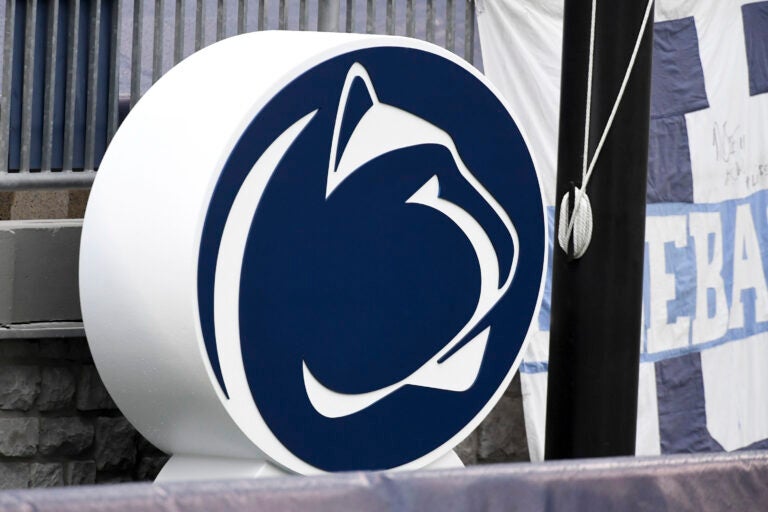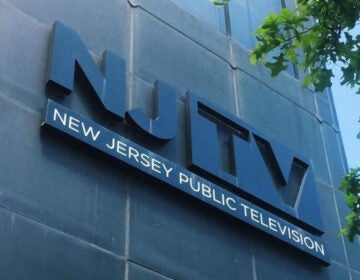Penn State to wind down WPSU after board of trustees declines transfer to WHYY
In voting down a proposal to transfer the station to WHYY, trustees expressed concern over a $17 million subsidy and wanted a commitment to hire staff.
Listen 1:27
File - A Penn State Nittany Lion logo decorates a wall in the end zone of an NCAA college football game between Penn State and Iowa in State College, Pa., on Saturday, Nov. 21, 2020. (AP Photo/Barry Reeger)
From Philly and the Pa. suburbs to South Jersey and Delaware, what would you like WHYY News to cover? Let us know!
Penn State University plans to shut down its NPR and PBS-affiliated public broadcasting station, WPSU, after the university’s trustees rejected a proposal to transfer ownership to WHYY.
If approved, the deal would have transferred WPSU’s broadcast licenses — covering 24 counties for television and 13 counties for radio across central and northern Pennsylvania — to WHYY, subject to the approval of the Federal Communications Commission.
In a statement to WHYY News, PSU said that they have budgeted funds for WPSU’s operations through the end of June 2026 and the university is currently developing a plan to wind down and cease operations by then.
Shortly after the vote on the proposal, PSU’s vice president for outreach, Larry Terry, sent an email to WPSU’s staff announcing the decision.
“The failure to approve this transaction is unfortunate, as it was the most feasible option to keep the station open and broadcasting,” he said. “The other scenario provided to trustees – and the one that is now unfortunately our new reality – is for the University to wind down operations and close WPSU.”
WHYY had been in talks with PSU about taking over the station since spring 2024, WHYY’s CEO Bill Marrazzo told WHYY News. Marrazzo called Thursday’s decision “a shame,” adding that “1.5 million Pennsylvanians will not have free access to a public media experience.”
“It’s a serious blow,” he said.
The Penn State Board of Trustees Finance and Investment Committee voted against the proposed transaction, taking issue with a $17 million subsidy the university would have paid over five years and what they saw as WHYY’s lack of commitment to hire WPSU’s staff, which currently numbers 44 full-time positions.
WHYY News obtained a recording of the trustee’s meeting.
“I don’t like to pay somebody a subsidy to run a business and, at the end of the day, there’s no guarantee they’ll stay in business,” trustee Robert Fenza told the committee. “They’re going to get all these assets and then the thing that bothered me the most is that they have not committed to hire our employees in the agreement. It said they may, and that also means they may not and that’s not good enough for me.”
Another committee member, Anthony Lubrano, agreed and called it a “difficult decision” before joining the unanimous vote against the proposal.
“I don’t think the way this deal is structured maximizes value to this institution,” he said. “And I think we need to do a little bit more exploratory work before I’m comfortable approving a deal like this.”
Marrazzo said he believed the deal was fair, noting that the proposal was the result of 13 months of negotiations between WHYY and the university.
He said the subsidy would have been paid out over five years, declining each year, and was intended to “keep WHYY whole” while rebuilding the business infrastructure of the Central Pennsylvania station.
“The rate of the subsidy over the five-year period was pegged to the business risk WHYY was willing to take to rebuild all of their revenue production capability. They have none,” he said. “I was not willing to compromise WHYY sustainability in order to get WPSU out of the red.”
Marrazzo said that the terms regarding staff were also intended to bring WPSU “back into a sustainable situation” by focusing on revenue-producing positions.
“The number of employees who are on the payroll right now who don’t have that capability, that’s unfortunate, but it is the reality, so that point was not negotiable,” he said. “We could not guarantee everyone a job, but we were certainly anxious to hire as many of those people as we could.”
The move comes in the wake of Congress’ decision earlier this year to eliminate all federal funding for public broadcasting. According to analysis by Alex Curley, a former NPR staff member who writes the blog Semipublic, WPSU and other university-owned stations may be especially vulnerable to those cuts. Curley found that college-affiliated public stations depend far more heavily on “non-operating revenue” — money from the Corporation for Public Broadcasting and direct university subsidies — than their independent counterparts.
More than half of NPR-affiliated stations are linked to colleges, as are dozens of PBS stations.
However, the financial troubles started much earlier at WPSU, which has relied on annual subsidies of at least $3.4 million from the university. The recent rescission of federal funding for public media only intensified the budget pressures on the station.
The university reduced its contribution by 20% this fiscal year, with more cuts planned. Those financial pressures are part of a broader budget crisis at Penn State. The state legislature has left Penn State’s state appropriation effectively flat for years, even as costs have risen. The university announced a multimillion-dollar deficit in 2022 and has, since then, enacted deep cuts across its colleges, including moving to shutter many of the university’s smaller Commonwealth Campuses amid steep enrollment declines and mounting maintenance costs.
The prospect of a closure also raises questions about the station’s longstanding role as a training ground for Penn State’s journalism and communications students as WPSU works closely with the university’s News Lab. Emily Reddy, news director at WPSU-FM, estimates she has mentored roughly 60 interns during her 17 years at the station, many of whom have gone on to careers in national and local newsrooms and won prestigious awards.
“I have past interns who are capital reporters in Washington, D.C. for major networks,” she said. “I have past interns who are doing podcasts, who are at newspapers, who are at local television stations or radio stations all over the country.”
She added that she is “shell-shocked” over the decision.
In his letter to staff, Terry said the university recognized “WPSU is not just a station.”
“It is a community built by your dedication, creativity, and care,” he said. “For more than 70 years, you’ve sparked discovery, enriched learning, and strengthened community through vibrant public media. That legacy matters deeply. WPSU has honorably served Central Pennsylvania, telling stories about our surrounding communities and the people who make the region so vibrant.”
David Kleppinger, chair of PSU’s board of trustees, called it “an incredibly difficult decision.”
“WPSU has long provided quality public broadcasting programming for communities throughout Central Pennsylvania,” he said. “We have worked with the administration to find the best path forward for the station and our people who work there. But, given the significant headwinds facing higher education and public media, we could not support the proposed transaction. We know this is a deeply disappointing outcome and we are grateful to the dedicated WPSU employees whose work has enriched our lives and made our community stronger.”

Get daily updates from WHYY News!
WHYY is your source for fact-based, in-depth journalism and information. As a nonprofit organization, we rely on financial support from readers like you. Please give today.






